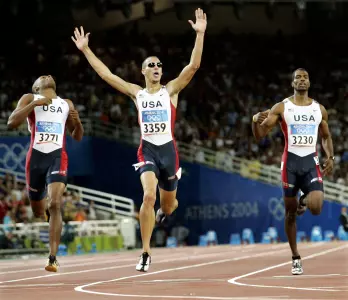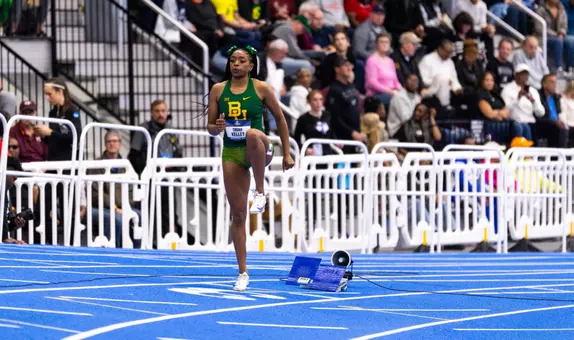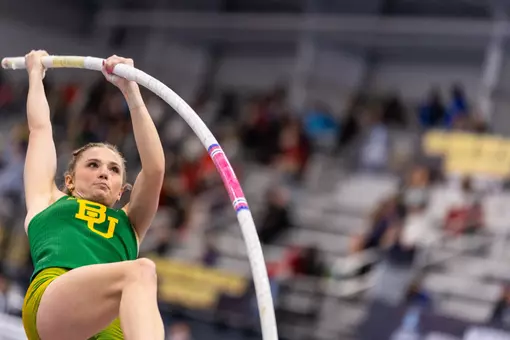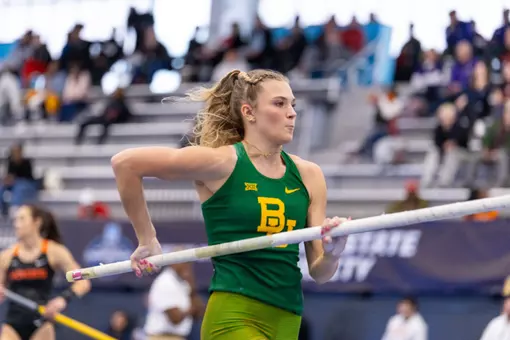
2014 Hall of Fame Profile: Jeremy Wariner
10/23/2014 12:00:00 AM | General, Track & Field, "B" Association
EDITOR'S NOTE: This is the fourth in a series of profiles on the 2014 Baylor Hall of Fame induction class.
By Jerry Hill
Baylor Bear Insider
Coming off an injury-plagued freshman season that saw him finish seventh indoors and not even run the open quarter at the NCAA outdoor meet, no one could have predicted or even dreamed what 2004 would hold for Jeremy Wariner.
By most standards, the sprinter from Arlington, Texas, had a phenomenal freshman year at Baylor. He suffered a strained quadriceps muscle in finishing seventh in the 400 meters at the NCAA Indoor Championships and then battled through an ankle injury to run the leadoff leg on a 4x400 relay that placed fifth outdoors, earning a pair of All-America honors.
But who could see this coming?
"Not at all," he said. "After my freshman year, with all those injuries, my main goal was just to get through the season healthy and help out the team as much as I could at conference and nationals."
In fact, Wariner did something that no one has done before or since. As a 20-year-old sophomore, he swept the NCAA indoor and outdoor 400-meter titles and went on to capture the gold medal at the 2004 Olympics in Athens, Greece, with a school-record time of 44.00 seconds that still stands.
"When I got to the Olympics, it was just more about the experience and enjoying myself and not worrying about all the competitors," said Wariner, who is part of the 2014 Baylor Hall of Fame Class that will be inducted as part of next week's Homecoming activities. "Everyone was predicting that either Derrick Brew or (Alleyne) Francique from Grenada was going to win. They didn't give me the time of day because I was so young."
Wariner's magical season began at the Big 12 Indoor Championships in February, when he outdueled Baylor teammate Darold Williamson to win the 400 meters in 45.78. "I was fortunate to train with someone like Darold every day, helping me get to that next level," Wariner said. "Even at practice, whatever we ran, we would try to beat the other guy. We ran hard every time we stepped on the track. I knew I couldn't mess up, because if I did, he would beat me."
Two weeks later, at the NCAA Indoor Championships in Fayetteville, Ark., Wariner led wire-to-wire in clocking the world's fastest time that year at 45.39 seconds. And then he teamed with Williamson, Mark Teter and Jamen Saziru in breaking the collegiate and NCAA meet record in winning the 4x400 relay in 3:03.96.
Disqualified at the Big 12 outdoor meet for running out of his lane in the 400, Wariner redeemed himself by winning the NCAA title in 44.5 and helping the Bears capture their eighth outdoor national championship in the 4x400 relay with a world-leading time of 3:01.03 in what turned out to be his final collegiate meet.
Even with the best time in the world going into the USA Championships and Olympic Trials that summer, Wariner's goal was just to make the USA team.
"I knew I had the fastest time, but it's a different meet. A lot of the professionals don't run fast until certain times of the year. So early on, the college kids always have the fastest times," he said. "I was confident in myself, so I just had to run my race instead of trying to change things up. And I was fortunate on that day, I ran perfect and was able to end up winning."
Beating a field that included Brew, Otis Harris and Williamson, who was fourth and earned a spot in the relay pool, Wariner stamped himself as one of the favorites going into the Olympics.
Coming off the final curve, Wariner trailed Harris. But with a signature kick down the stretch, he won with a sizzling time of 44.00 as Harris (44.16) and Brew (44.42) completed the American sweep.
"I knew it was going to be close, but I just stayed calm and stayed relaxed," he said. "If I would have tightened up one bit, I would have gotten second or third. It's really just the way we train at practice. We train for races like that. Every meet leading up to that race, running neck-and-neck with Darold, I was running in those types of situations. And whoever stayed relaxed the longest was the one that won. So I had been there before, and I knew what to do."
The crowning, cherry-on-the-top moment came at the end of the Olympics, when Wariner and Williamson teamed up again. Although the USA coach asked him about anchoring, Wariner didn't want to change up a good thing and let Williamson anchor.
USA's team of Brew, Harris, Wariner and Williamson blazed to a winning time of 2:55.91, beating the runner-up Australians by nearly five seconds.
"Me and him were perfect for the year, and I didn't want to ruin that," Wariner said. "Just knowing that I was handing it off to my college teammate, I knew when I gave him the stick that wherever we were, we were going to win, no matter what. I knew what kind of runner he was. And say we were in second, if we ever were, I knew he would be able to catch up."
While that may ultimately be the pinnacle, Wariner's career did not begin and end in Athens, Greece.
Since turning pro after the 2004 Olympics, he has gone on capture five World Championship gold medals (twice in the 400 meters and three times in the 4x400 relay), came back to win the silver medal in the 400 and gold in the relay at the 2008 Olympics in Beijing, China, and earned a $250,000 jackpot by remaining unbeaten in the 2006 AF Golden League races.
Other than a one-year hiatus, during the 2008 Olympics, Wariner has teamed with legendary Baylor track coach Clyde Hart.
"I love Coach Hart," Wariner said. "That one year hurt. We had our little feud going, but we were able to get through it. I'm hoping that we can get back to where we were on the track so that when we both decide to stop running and coaching, we can stop on top. He's always taking care of his athletes and doing what's best for us and never putting us in a situation where we would hurt ourselves. And you don't get that all the time. I'm looking forward to these next few years to finishing off a great career with him."
Although he hasn't won a major title since the 2007 World Championships, Wariner said he is "not ready to hang it up."
Still ranked No. 1 in the world as recently as 2010, Wariner believes he can get back down to the 43-second timings and finish it off at the 2016 Olympics in Rio de Janeiro, Brazil.
"Just knowing the way that I was practicing last year, my workouts have been great," he said. "It was just toward the end of the week, I was getting tired. And unfortunately, a lot of it was my body was messed up, my body was hurting. I know that if I can stay healthy, I know I can run fast. It's going to take a lot of work and a lot of focus, but I know it's possible."
Jeremy and his wife, Sarah, have a 2-year-old son, Lincoln, and another boy on the way in December, along with Jeremy's 9-year-old stepdaughter, Isabella.
"It's strange just knowing that I'm still running and I'm being inducted," he said. "It was the same way when I was being inducted into the Drake Relays Hall of Fame. I actually ran the next day. But it's a great honor and I'm going to enjoy my time. There were a lot of great athletes with me at Baylor, and it's just an honor to be recognized like that."
Joining Wariner in the 2014 Hall of Fame class are fellow track All-American Yulanda Nelson, football's Adrian Robinson and Richard Stevens and ,baseball's Jon Topolski and Ted Uhlaender.
Tickets for the Hall of Fame Banquet, which will be held at 7 p.m. next Friday, Oct. 31, at the Ferrell Center, cost $50 per person. Table sponsorships are also available at $750 (individual) and $1,000 (corporate). Contact Tammy Hardin in the "B" Association office at 254-710-3045 or tammy_hardin@baylor.edu.


















